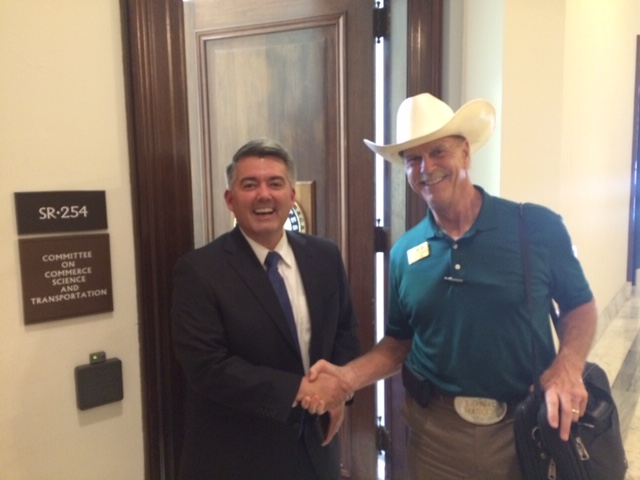COP is Your Voice in the United States Congress
*** Personal Responsibility must be the Cornerstone of Drug Policy ***
A Lone Ranger goes to Washington to repeal Drug Prohibition and end the War on Drugs: Ask Him Why*
by Mary Ann Akers of the Washington Post
Howard Wooldridge has one of the craziest jobs: trying to convince 535 of the most uptight people in Washington – the entire membership of Congress – to repeal drug prohibition. That means everything from marijuana to cocaine to heroin. He urges them to adopt the 10th Amendment (states’ rights) as a guiding principle for drug policy.
*To re-direct police resources to go after the pedophiles and end the job option for kids to sell drugs (10 are shot daily). Have a drug problem? See a doctor.
Ann Landers came out for marijuana legalization/regulation before her death in 2002.
Supporters of the War on Drugs/Modern Prohibition (an unholy alliance of politicians, cops, terrorists and criminals)
1. Fraternal Order of Police, Mexican Drug Cartels, National Sheriff’s Association
2. International Chiefs of Police Association, MADD
3. Senators Cornyn, Rubio, Lankford and Chuck Grassley
4. Big Pharma, Private Prison Industries, Inc.
5. California Narcotics Officers Association, ISIS, the Taliban
6. MS-13 Gang Association, Crips and Bloods – Hell’s Angels
7. The Washington Post, New York Times, Washington Times
8. FARC of Colombia, Shining Path of Peru
9. President Trump
10. Congressman Gosar of Arizona
11. Meth Makers Association of Mexico
12. Every criminal supports the drug war, as the police have less time to go after them.
Enemies of Drug Prohibition
1. COPs – Citizens Opposing Prohibition
2. Governor Gary Johnson (R-NM) -former,
3. William F. Buckley, Ann Landers & Milton Friedman- now with the angels
4. Drug Policy Alliance
6. Mike Jones – Deputy Chief of Police (ret.) — Peter Christ -police captain (ret.)
7. LEAP – Law Enforcement Against Prohibition – Eric Sterling of CJPF
8. Congressmen Massey, Joyce, Titus, Tom Emmer: Senators Paul, Baldwin, Booker
9. VMMA – Veterans for Medical Marijuana, CATO Institute
10. Your name here
Where to go in 2025 at the state and federal levels: Decriminalization of all drugs in small amounts
This is where the nation needs to go to reduce tension and anger in our communities, especially the minority ones. It will also save local and state govts billions, when they follow a Congressional model. Portugal has been doing this very successfully the past 22 years.
Factoid: 1.4 million arrested in USA in 2019 for simple possession (half for marijuana, half for hard drugs). Roughly, 10 searches are needed to find one baggie of illegal drugs.
Not every user is an abuser
Supporting Information:
Since legalization in Colorado, the vehicle search rate of African American drivers 21 and over dropped by nearly half, while the search rate of Hispanic drivers fell by 58 percent. White drivers faced almost two-thirds fewer searches after recreational marijuana was
legalized. http://www.businessinsider.com/police-are-searching-far- fewer-cars-in-states-that-have-legalized-marijuana-2017-6
Q: Will this increase illegal drug use and abuse?
- No. Per medical experts in the area of drug use and addiction, criminal penalties for drug use consistently rank very, very low, as a reason to use or not use illegal drugs.








